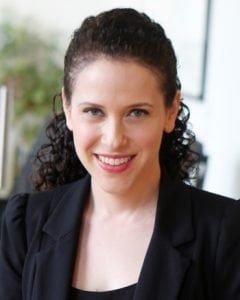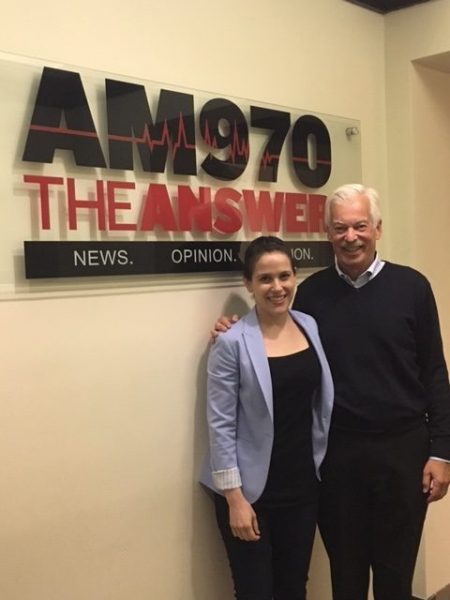Denver: We’re going to play Take Five with Lindsay Firestone Gruber, the CEO of the Taproot Foundation. Are you ready, Lindsay?

Firestone Gruber
Lindsay: I am ready!
Denver: What should we as a society be worried about?
Lindsay: We should be worried about the fact that we are increasingly counting on nonprofit organizations to serve a desperate and needy set of social challenges, and yet continuing to under resource their ability to do that,
Denver: What is one of your favorite documentaries or movies?
Lindsay: There are so many to pick from. I’m not a superlative person. This one’s a little too hard. There are so many amazing ones I’ve seen.
Denver: What is today’s most underreported story?
Lindsay: I’d say one of many underreported stories is the incredible work being done off the side of people’s desks within nonprofit organizations to find other ways to help the individuals and communities that their organizations are otherwise serving.
Denver: What is something you believe that other people think is just insane?
Lindsay: I believe that being able to provide pro bono service to organizations someday will become more valuable and more valued than cash giving alone.
Denver: Name some organization or person that you have a tremendous amount of respect and admiration for.
Lindsay: Well, particularly, just off the heels of the recent announcements, I have so much admiration for what the Hewlett Foundation has done in coming forward and commissioning the work around identifying the true cost of nonprofits’ projects, and then working together with their peers to say that we have to start investing in supporting the true cost of nonprofits’ work.
Denver: What’s the most important thing that makes for a healthy organizational culture?
Lindsay: I think that our values in particular of pragmatic optimism, as well as playful professionalism and the rest, are critical in making sure that you have the biggest dreams possible and the clarity of mind and dedication to the resources that actually make them achievable.
Denver: What have you changed your mind about in the last 10 years and why?
Lindsay: So many things, as I think one should, but I’d say one thing in particular is the fact that in-person meeting time and in-person working time, particularly in the context of pro bono projects, is very valuable, and yet is increasingly more onerous than being able to facilitate the best possible virtual work.
Denver: If you were a kitchen utensil, what would you be?
Lindsay: I love every variety of kitchen utensil, but I have to say I have this spatula spoon combination that I’m a huge fan of for anything sauté-related.
Denver: If you were to pick up a magazine, what would that be?
Lindsay: For years, I was an avid reader of The Week because it was a great synopsis that was just long enough for my subway ride.
Denver: What do you wish people would be more open and honest about?
Lindsay: I wish people would be more open and honest about the things that they are questioning and unsure of, so they could actually then be comfortable asking questions and engaging in an open dialogue to be better informed and maybe form a point of view or change their mind.
Denver: If you were to start your career all over again and do something completely different and away from this field, what would that be?
Lindsay: I am incredibly passionate about what access to education can do to change someone’s life. So I think I would pour myself into ways I could in some way be supportive of the best initiatives around making that more possible.
Denver: What’s your superpower?
Lindsay: My superpower I think is some combination of empathy and creativity and coming up with solutions after having a better sense of what someone really needs.
Denver: Name one of your favorite restaurants.
Lindsay: So many restaurants I love going to, but I’d say living downtown, one of the most interesting and delicious meals I’ve had in a while is the octopus pastrami at Batard.
Denver: What is something, whether this is related to your work or not, that you’re exceptionally excited about at the moment?
Lindsay: I am exceptionally excited about the fact that on our TaprootPlus platform we have now exceeded $20 million worth of pro bono provided since 2014 alone. I think that for any type of traditional foundation would be incredible, and to have that be in pro bono service from folks all around the world is heartening beyond just the dollar value itself.
Denver: Name a book that you’d give as a gift.
Lindsay: Well, I still laughingly refer back to a book that our founder Aaron Hurst wrote along with his wife Kara Hartnett Hurst – “Mommy and Daddy Do it Pro Bono.” That’ll help you turn your work as a pro bono marketer or a pro bono IT consultant into something just as exciting to your child as being a firefighter.
Denver: What is one thing you wish you really understood more fully?
Lindsay: I wish I more fully understood what compels people to have certain beliefs that I feel are so counter to things I feel strongly about.
Denver: What topic would you speak about if you were asked to give a TED talk on something outside your main area of expertise?
Lindsay: Outside my main area of expertise, I’d say – one interesting twist might be the fact that I am a twin, and people are endlessly fascinated by that and yet also somehow suspend their common sense when asking questions about what it’s like to be a twin. So there could be something interesting there if I’m not allowed to talk about pro bono – getting into what it means to be a twin.
Denver: Other than that, what is something about you that very few other people know?
Lindsay: Let’s see. Well, normally being an identical twin is my secret story in that respect, so I guess I blew that one. Something a lot of folks don’t necessarily know, growing up, my family and I would spend our summers in Michigan, which is where my extended family is originally from, and that meant, when we had the chance, being able to spend time out at a lake, no TV, certainly no internet back then, no nothing, catching frogs, swimming in the lake, playing in that way. Living in Manhattan for as long as I have now, I don’t necessarily think you’d know that I know how to gunnel on a canoe.
Denver: There you go. Given the choice of anyone famous in the world, dead or alive, that you could invite over as a dinner guest, who would you invite?
Lindsay: Well, I’m going to repeat what is probably a pretty common answer, but for a different reason. I will say Michelle Obama. The reason I want to say that, among many, is that I think she has an incredible power to be of interest to and influential to so many different people, and I think it’d be fascinating to be able to dig in and understand how we might be able to impart some of that superpower unto other people.
Denver: What is the best constructive criticism you have ever received?
Lindsay: I think, as the old adage goes, that feedback is a gift. I truly believe that. So I actually try to take as much of it as possible. I think one piece of constructive criticism that stands out to me that I really took to heart years ago is that: your truth is your truth, but someone else has their truth, and even in a professional setting, you can feel very strongly about something as a fact without realizing that someone else has information that makes something else just as much of a fact to them, and that it can be very helpful to lay out a little bit of context for where you’re coming from, instead of jumping to the specific fact, that is the subject of the topic you’re talking about.
Denver: What is something that everybody else seems to love but you really don’t like?
Lindsay: My husband will laugh at this: watermelon. I’m apparently the one person in the entire country who doesn’t love watermelon.
Denver: What advice would you give to your 20-year-old self?
Lindsay: I would tell my 20-year-old self that you were on the right track because I, as I like to say, I knew the verbs of what I wanted to do, but I didn’t know that nouns of where I wanted to do that. And at that point in my life in college, so many folks were going down the more traditional path of on-campus recruiting, either going to a consulting firm or a bank or law school, and I nervously decided to instead use my summer internships to test out different sectors. And at that moment in time, I was a little anxious about what the opportunity cost was of that and what I would be learning. It ultimately led me to the path that I’m on now, which I’m incredibly grateful for.
Denver: Finally, do you have a quote you live your life by or think of often?
Lindsay: One that has always been there in the back of my mind, and I know there is a more up-to-date way probably of putting it, but the easiest one to grab onto is treating other people the way you’d want to be treated. I think if you start there, you’re at least always heading in the right direction.
Denver: Thanks very much, Lindsay.
Lindsay: Thank you to you.

